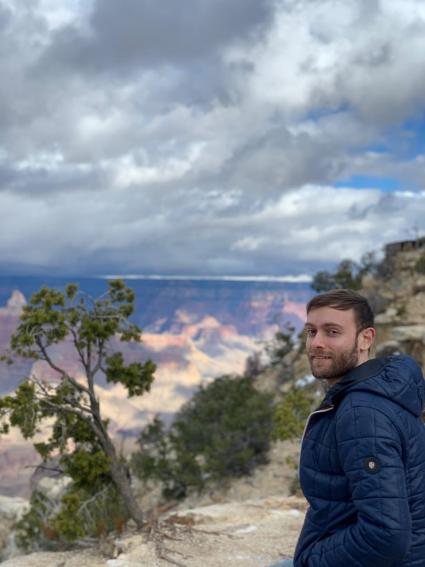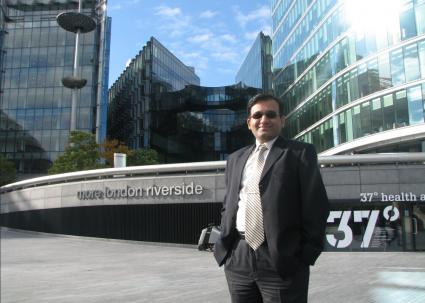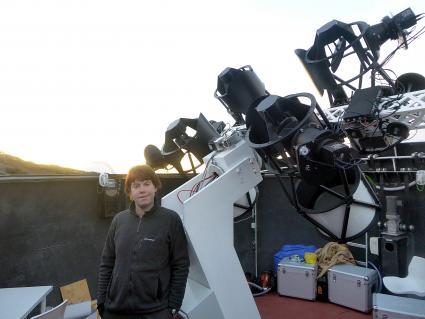The RAS is pleased to announce the winners of its prizes for the best PhD theses completed in the UK during 2019.
Prizes are awarded annually: the Michael Penston Prize for the best thesis in astronomy and astrophysics, the Keith Runcorn Prize for the best thesis in geophysics and planetary science, and the Patricia Tomkins Prize for the best thesis in instrumentation science for astronomy and geophysics.
The Michael Penston Thesis Prize 2019
The Michael Penston Thesis Prize 2019 is awarded to Dr Luke Pratley for his thesis on "Radio Astronomy Image Reconstruction in the Big Data Era".
Dr Pratley completed his BSc and MSc in New Zealand and was subsequently was awarded three separate scholarships to undertaken his PhD at UCL, including the William Georgetti Scholarship, the country's most prestigious award, given by the Governor General of NZ.
Following his PhD thesis at UCL on wide-field interferometric imaging, he started a Dunlap Fellowship at the University of Toronto in October 2019. During the course of his studies, Dr. Pratley has undertaken original research in astrophysics, condensed matter physics, and nanophotonics. His current work now focuses on interferometric imaging, polarimetry, and cosmic magnetism, and he is an active member of the Canadian Hydrogen Intensity Mapping Experiment (CHIME) and Murchison Widefield Array (MWA) collaborations.
The runners up are Dr Cleo Loi for her thesis on "Magnetic Fields and Stellar Oscillations" and Dr Oliver Tattersall for his thesis on "Testing Gravity with Black Holes".
Keith Runcorn Thesis Prize for 2019
The Keith Runcorn Thesis Prize 2019 is awarded to Dr Muhammad Atif Nawaz for his thesis on "Efficient Probabilistic Inversion of Geophysical Data".
After a decade of diverse practical experience in geophysical exploration and software development, Dr Nawaz finally satisfied his long-held aspiration to become a scientific researcher. His desire to contribute to scientific knowledge led him to undertake a PhD degree in geophysics at the University of Edinburgh as a mid-career student under the supervision of Professor Andrew Curtis.
During his PhD he developed novel variational inference methods to solve probabilistic inverse problems in geophysics. Dr Nawaz's most recent research interests revolve around applications of machine learning to solve seismic imaging and inversion problems. He aims to pursue his research and development interests in geophysics and related disciplines making use of the modern advances in computing technology.
The runner up is Dr Hayley Allison for her thesis on "Understanding how low energy electrons control the variability of the Earth's electron radiation belts".
RAS Patricia Tomkins Thesis Prize 2019
The Patricia Tomkins Prize 2019 is awarded to Dr Martin Dyer for his thesis on "A telescope control and scheduling system for the Gravitational-wave Optical Transient Observer"
Dr Dyer completed his undergraduate degree in 2015 at the University of Durham, after which he moved to the University of Sheffield for his PhD working on the GOTO project with Professor Vik Dhillon. Following the completion of his thesis in 2019, he remained at Sheffield as a departmental-funded postdoc, continuing to support the GOTO telescope in La Palma while also carrying out design work for the SAMNet solar telescope project. Next year he will start a two-year research project funded by the Leverhulme Trust, to continue development and optimisation of the GOTO scheduling and control software as additional telescopes are deployed across the globe.
The runner up is Dr Charles Walker for this thesis on "Localising Fast Transients".
Media contacts
Dr Robert Massey
Royal Astronomical Society
Tel: +44 (0)20 7292 3979
Mob: +44 (0)7802 877 699
press@ras.ac.uk
Dr Morgan Hollis
Royal Astronomical Society
Mob: +44 (0)7802 877 700
press@ras.ac.uk
Notes for editors
The Royal Astronomical Society (RAS), founded in 1820, encourages and promotes the study of astronomy, solar-system science, geophysics and closely related branches of science. The RAS organises scientific meetings, publishes international research and review journals, recognises outstanding achievements by the award of medals and prizes, maintains an extensive library, supports education through grants and outreach activities and represents UK astronomy nationally and internationally. Its more than 4,400 members (Fellows), a third based overseas, include scientific researchers in universities, observatories and laboratories as well as historians of astronomy and others.
The RAS accepts papers for its journals based on the principle of peer review, in which fellow experts on the editorial boards accept the paper as worth considering. The Society issues press releases based on a similar principle, but the organisations and scientists concerned have overall responsibility for their content.
In 2020 the RAS is 200 years old. The Society is celebrating its bicentennial anniversary with a series of events around the UK, including public lectures, exhibitions, an organ recital, a pop-up planetarium, and the culmination of the RAS 200: Sky & Earth project.
Follow the RAS on Twitter, Facebook, Instagram and YouTube and subscribe to our new RAS Supermassive podcast.




